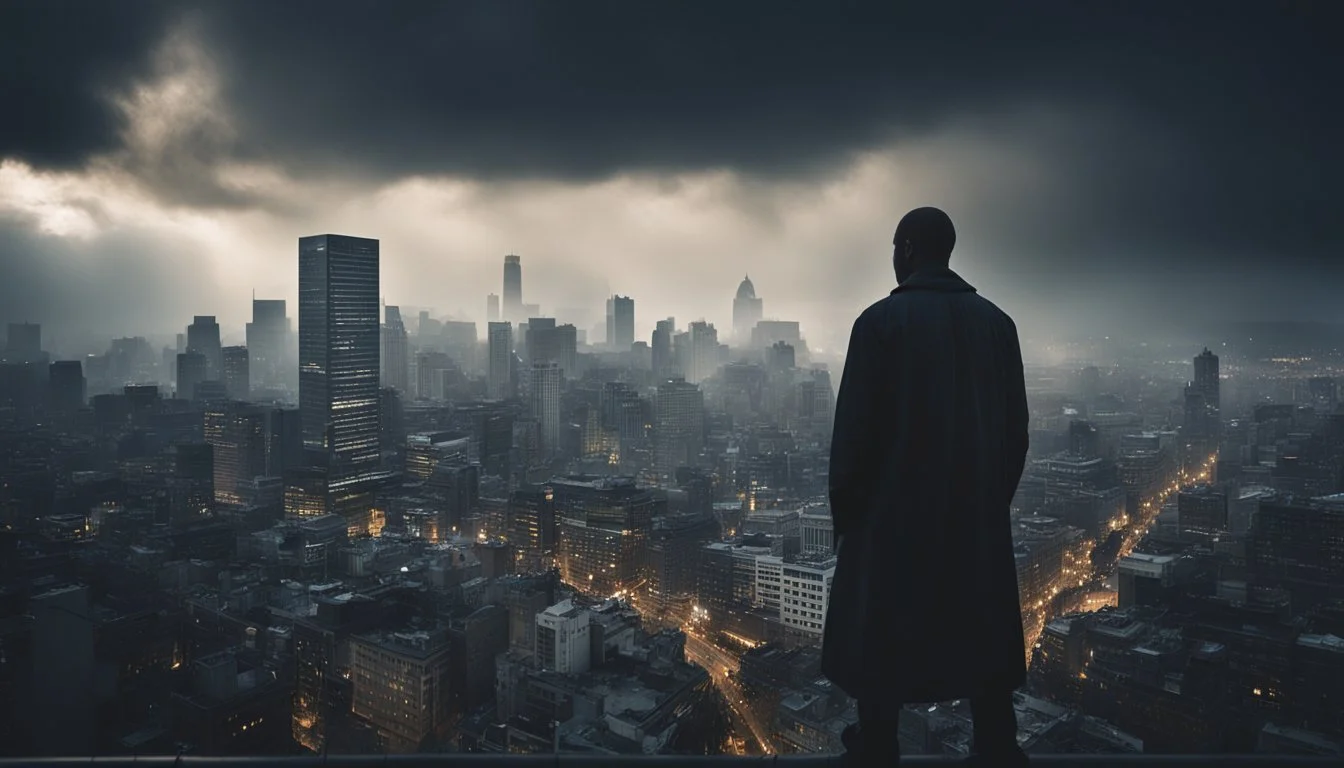8 Films That Humanize the Experience of Schizophrenia
A Deep Dive into Mental Health Representation
Schizophrenia is a complex and often misunderstood mental health condition that greatly impacts individuals' perceptions and experiences of reality. It can lead to hallucinations, delusions, and profound changes in behavior and thinking. Despite its challenges, many films have endeavored to present a more nuanced portrayal of life with this condition, aiming to generate empathy and awareness among audiences.
These films serve as a powerful medium to bring the realities of schizophrenia into the broader public consciousness. By humanizing the experience of schizophrenia, movies can bridge the gap between misunderstanding and empathy, offering viewers insights into the condition’s impacts on those who live with it and their relationships. Through storytelling, they encourage dialogue and reflection on mental health, fostering a deeper recognition of the struggles and strengths associated with schizophrenia.
1) A Beautiful Mind (2001)
A Beautiful Mind presents the journey of John Nash, a mathematician battling schizophrenia.
The film is notable for its accurate depiction of Nash's struggles with the condition and his contributions to mathematics, highlighting not only his genius but also the challenges he faced.
Russell Crowe's portrayal of Nash earned acclaim for bringing depth and humanity to the role, illustrating the complexity of living with schizophrenia.
By focusing on Nash's personal and professional life, the movie provides insight into how schizophrenia affects not only the individual but also relationships with family and peers.
This film played a significant role in reducing stigma around mental illnesses by offering an empathetic view into Nash's life.
Director Ron Howard's work on A Beautiful Mind earned widespread recognition, including four Academy Awards, and furthered public discourse on mental health.
For more information, visit the Wikipedia page for A Beautiful Mind.
2) Donnie Darko (2001)
"Donnie Darko" offers a unique portrayal of schizophrenia through its lead character, Donnie. The film follows a teenager who experiences vivid hallucinations, including encounters with a mysterious figure in a rabbit costume. This character, Frank, guides Donnie on a journey that mixes reality with delusion.
Viewers are introduced to the complexities of Donnie's mind as he grapples with these visions. His therapist diagnoses him with paranoid schizophrenia, though the film takes creative liberties in its exploration of his mental state. This diagnosis serves as a crucial plot element, driving the narrative and interaction with other characters.
The film's depiction of Donnie's condition, while dramatized, highlights the struggles associated with schizophrenia. It touches on themes of isolation, existential uncertainty, and the impact of mental health on daily life. Through its surreal storytelling, the film invites the audience to question reality alongside Donnie.
Despite being set in a fictional world, "Donnie Darko" gives insight into the challenges faced by individuals with schizophrenia. Its depiction prompts reflection on mental illness, exploring its influence on behavior and perception. Learn more about the film on Wikipedia.
3) The Soloist (2009)
"The Soloist" explores the profound story of Nathaniel Ayers, a once-promising cellist whose career is interrupted by the onset of schizophrenia. The film offers a thoughtful look at Ayers' life, highlighting his struggles and the impact of mental illness on his journey.
Nathaniel studied at The Juilliard School, showcasing immense talent before his diagnosis. The film captures his transition from the esteemed halls of this conservatory to the streets of Los Angeles, painting a vivid picture of the challenges he faces.
His relationship with journalist Steve Lopez brings an important human element to the narrative. This dynamic portrays an inspiring bond that sheds light on the complexities of mental illness while emphasizing hope and resilience.
Jamie Foxx's portrayal of Nathaniel Ayers is noted for its depth and authenticity, lending credibility to the character's experiences. The film serves as a reminder of the fine line between genius and hardship, resonating with audiences through its empathetic storytelling.
This drama underscores the need for understanding and supporting those affected by mental health issues. It prompts viewers to consider the profound effects that such conditions can have on an individual's life and relationships. Learn more about The Soloist on Wikipedia.
4) Clean, Shaven (1993)
"Clean, Shaven" offers a raw depiction of schizophrenia, driven by Lodge Kerrigan's direction. This film stands out for its intense portrayal of a man’s struggle with mental health while attempting to reunite with his daughter. The narrative focuses on conveying the internal chaos and isolation that can accompany schizophrenia.
Peter Greene's performance as Peter Winter captures the disorientation and desperation of living with this condition. The film uses sound and visuals to evoke the protagonist's tumultuous mental state, creating an immersive experience for viewers.
By presenting schizophrenia through the subjective lens of the character's mind, "Clean, Shaven" challenges viewers to empathize with the protagonist's reality. The film received recognition for its powerful storytelling, winning the Silver Hugo Award at the 1993 Chicago Film Festival.
For more information about "Clean, Shaven," you can visit Wikipedia.
5) It's Kind of a Funny Story (2010)
"It's Kind of a Funny Story" is a film directed by Anna Boden and Ryan Fleck. Released in 2010, it offers a poignant look at teenage mental health struggles. The story follows Craig Gilner, a 16-year-old who admits himself to a psychiatric hospital after experiencing suicidal thoughts.
Within the confines of the hospital, Craig finds an unexpected community. Here, he meets various characters, including Bobby, played by Zach Galifianakis, who brings humor and warmth to the narrative. The film delicately balances themes of mental health with moments of light-heartedness and hope.
Adapted from Ned Vizzini's 2006 novel, the film is semi-autobiographical, drawing from Vizzini's own experiences. It touches the audience by exploring themes of friendship, healing, and self-discovery, making it a relatable and insightful portrayal of mental health struggles in adolescence.
For more information, visit Wikipedia.
6) Take Shelter (2011)
"Take Shelter" is a psychological thriller that explores the delicate line between mental illness and reality. The film, directed by Jeff Nichols, stars Michael Shannon as Curtis, a husband and father who experiences unsettling apocalyptic visions.
These visions lead Curtis to question his own sanity, suspecting he might have paranoid schizophrenia—a fear stemming from his mother's mental health history.
Throughout the movie, Curtis is torn between protecting his family from a potential storm and the growing concerns about his mental state. His internal struggle illustrates the challenges people with schizophrenia face, portraying both personal and interpersonal difficulties.
"Take Shelter" highlights the impact of these mental battles on daily life and family dynamics, deepening viewers' empathy for those who endure such experiences.
This film powerfully presents schizophrenia's complexity, urging audiences to reflect on the nature of mental health and the importance of understanding and compassion. The story offers a poignant look at how mental illness can shape and sometimes distort one’s reality, emphasizing the human aspect of living with schizophrenia.
For more information, visit Wikipedia.
7) Mental
"Mental" (2012) is an Australian dramedy directed by P.J. Hogan. It takes a unique approach to explore mental health by blending humor with the complexities of living with schizophrenia.
The film follows the story of a charismatic hitchhiker, Shaz, who comes into the lives of the Moochmore family. After the mother is committed due to a nervous breakdown, Shaz becomes the caregiver for the five daughters.
Through Shaz's eccentric methods, the film sheds light on the struggles and misconceptions surrounding schizophrenia and mental health. The narrative provides a chaotic yet heartfelt depiction of how mental illness can impact a family, challenging audiences to think differently about those experiencing it.
"Mental" offers a blend of reality and absurdity, delivering a fresh take on portraying mental health issues. Its combination of comedy and drama allows for a nuanced representation, making it both engaging and thought-provoking.
8) The Devil and Daniel Johnston (2005)
The film "The Devil and Daniel Johnston" focuses on the life of Daniel Johnston, a musician known for his lo-fi recordings and unique artistry. This documentary, directed by Jeff Feuerzeig, highlights Johnston's struggle with schizoaffective disorder, a condition marked by features of both schizophrenia and bipolar disorder.
The documentary takes viewers through Johnston's life, from his childhood in a fundamentalist Christian family to his rise as a cult figure in the music and art world. It explores how his mental health challenges influenced his creativity and artistry, offering audiences an intimate view of his experiences.
Throughout the film, Feuerzeig combines archival footage, interviews, and Johnston's own music to paint a vivid picture of the artist's complex world. The poignant portrayal of Johnston's life provides insight into the challenges faced by those with mental health conditions, making it a significant work in understanding schizophrenia and related disorders.
This documentary sheds light on how creativity and mental health intricately intertwine. By focusing on Johnston's life, it offers both a deeply personal story and a broader examination of the human side of mental illness. For more information, visit IMDb.
Understanding Schizophrenia
Schizophrenia is a complex mental health disorder that affects how a person thinks, feels, and behaves. It is characterized by a range of symptoms that can vary widely in type and intensity. Misunderstandings about the condition persist, complicating public perception and hindering effective support for those affected.
Symptoms and Diagnosis
Schizophrenia symptoms are typically grouped into positive, negative, and cognitive categories. Positive symptoms include hallucinations and delusions, where individuals may see or hear things that are not present or hold false beliefs. Negative symptoms refer to diminished emotions, reduced speaking, and withdrawal from social activities. Cognitive symptoms involve trouble with attention, memory, and decision-making tasks.
Diagnosis requires a careful assessment by mental health professionals and usually involves interviews, symptom tracking, and sometimes medical imaging. It's crucial for the diagnosis that symptoms persist for a significant period and impact various aspects of daily functioning. Early diagnosis can lead to more effective management and improved quality of life.
Common Misconceptions
There are several misconceptions about schizophrenia that contribute to stigma and misunderstanding. One common myth is that people with schizophrenia have "split personalities;" in reality, it involves a disconnection from reality, not a division of identity. Another misconception is the belief that those with schizophrenia are prone to violence. Statistics show most individuals with this illness are non-violent and more likely to be victims rather than perpetrators.
Media portrayals often sensationalize schizophrenia, highlighting extreme behaviors rather than depicting it accurately. Awareness and education can help debunk myths, fostering a more supportive and understanding society. Clarifying these misconceptions is essential for reducing stigma and promoting acceptance and empathy.
The Role of Films in Education
Films can significantly reshape societal perceptions of schizophrenia and foster meaningful dialogue about mental health. By using visual storytelling, they have the potential to educate audiences about complex psychological conditions in a relatable manner.
Impact on Public Perception
Movies can greatly influence how the public views schizophrenia and those who live with it. Films that accurately portray the condition can reduce stigma and combat stereotypes. By presenting characters with schizophrenia in nuanced ways, these films promote empathy and understanding.
Some films have been shown to alter misconceptions by portraying the daily struggles and triumphs of individuals with schizophrenia. Scholars have found that entertainment experiences can directly impact beliefs and attitudes, making informed cinematic portrayals an important educational tool.
Discussion Opportunities
Films create ideal platforms for fostering discussions about mental health, providing a space for people to explore thoughts and questions about schizophrenia. By engaging with storylines and characters, viewers are prompted to reflect on personal biases and societal norms related to mental illnesses.
Educational institutions can utilize films in their curricula to facilitate open conversations among students and educators. These discussions can emphasize the importance of empathy, challenge preconceived notions, and offer diverse perspectives on mental health issues, strengthening community engagement around crucial social topics.





